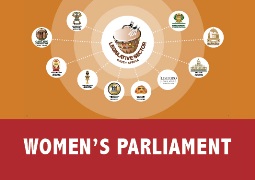
"The impact of Land Reform, Restitution, Redistribution and Security of Tenure for Women" was one of the topics discussed during the annual Women's Parliament.
Young and old women from all nine provinces gathered at the Saint George Hotel in Tshwane for the annual Women's Parliament which is organised by Parliament and the Legislative Sector Support Programme in celebration of women's contribution to the country's struggle for democracy.
Ms Bulelwa Tunyiswa, the Deputy Speaker of the Eastern Cape Provincial Legislature, said despite the available programmes and policies on land reform, women were still struggling in acquiring land.
"As long as we don't address the women and land issue of this country, the region and the continent, we have not liberated women," she said during one of the breakaway sessions of the conference.
She quoted the National Land Audit Report published in 2013 which she said reported that 79% of land was under ownership of men, who also happened to be white.
Access to information and funding, as well as government service centres that were located far from communities, were identified as some of the hindrances to women benefiting efficiently from existing government land reform and development programmes.
Reporting back on the second day of the event, following the discussions on the first day, Ms F Mkile said the main challenge in accessing land was because the majority of land is privately owned and the available land for distribution is not enough to cater for women, especial black women.
"We also discussed and recognised that although legislatures have a critical role to play to ensure that women access the land, but women themselves need to emulate the 1956 women and stand up and fight for land.
The commission also resolved that legislatures should conduct proper oversight over the executive by regularly visiting communities to monitor implementation of laws and to evaluate the impact of the laws, with a particular focus on the advancement of women's rights.
She said legislatures must also ensure that the executive allocates funds towards land reform programmes for women and the executive must account quarterly on progress thereof. The quarterly progress reports must have disaggregated data on the number of women who were able to access funds.
Ms Mkile said women must be educated about the benefits of owning land instead of opting for money during land restitution.
"Legislatures must conduct advocacy and awareness-raising initiatives to educate women about the various laws, policies and programmes in place aimed at land reform programmes. Since the dawn of democracy South Africa has embarked on a programme of land reform designed to redress the racial imbalance in land holding and secure the rights of the historically disadvantaged people.
"Various laws and programmes were introduced - Land Restitution, which provides for relief to the victims of dispossession; Commission of Restitution; the Land Claims Court and many others, including those about the protection of farm dwellers against unlawful evictions," she said.
A call was also made for Parliament to expedite the process of passing the Expropriation Bill to ensure that there are proper intergovernmental relations between various government departments that are involved in land reform and meaningful and successful land ownership by women.
"The legislatures must ensure that national policies are implemented at provincial and local spheres of governance and that there is congruence in the implementation of policies and share best practices on oversight initiatives and regularly conduct joint oversight initiatives with the national legislature," said Ms Mkile.
Another speaker from the same commission on the Impact of Land Reform, Restitution, Redistribution and Security of Tenure for Women, encouraged women to be actively involved in the activities of the High Level Panel that is currently assessing the impact of legislation, particularly with regard to the Working Group on Land Matters.
Ms J Jacobs said Parliament should ensure that the Department of Land Affairs has a gender focal points/persons in the department dealing with land reform issues. Parliament and provincial legislatures should ensure that land reform is be part of school curricula.
She said the legislatures should facilitate proper mentorship programmes for women and information sharing sessions for women by other women at national, provincial and local levels.
"Women must emulate the 1956 women and stand up and fight for land reform themselves and must take initiatives and seek information by using the internet and other available means of accessing information. Legislatures must ensure that the resolutions of the Women's Parliament are channelled to the relevant parliamentary Committees for implementation and regular follow-up with relevant departments and feedback to communities.
"Parliament and provincial legislatures should explore the implementation of "one woman, one hectare of land" as proposed by the Commission on Gender Equality. Parliament should ensure that the department responsible for land reform is adequately funded for full implementation. Parliament should engage with the Department of Land Affairs on available land being given to women immediately with appropriate support in terms of finance, training, access to markets, provision of infrastructure and regular and ongoing support.
"Parliament and provincial legislatures should regularly monitor the departments responsible safety and security to ensure that specific programmes are in place to protect women farmers against crime and violence. Parliament should engage the Minister of Finance on the possible establishment of a Women's Development Bank to assist women in securing funding," she said.
By Sakhile Mokoena
1 September 2016

